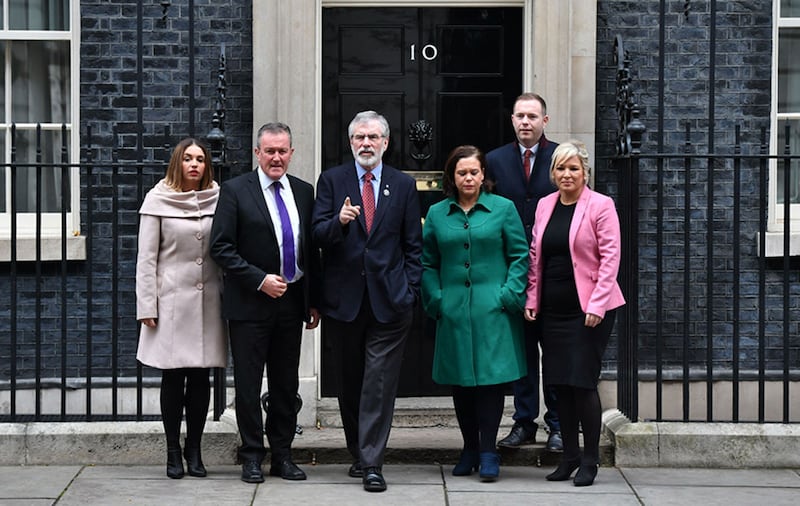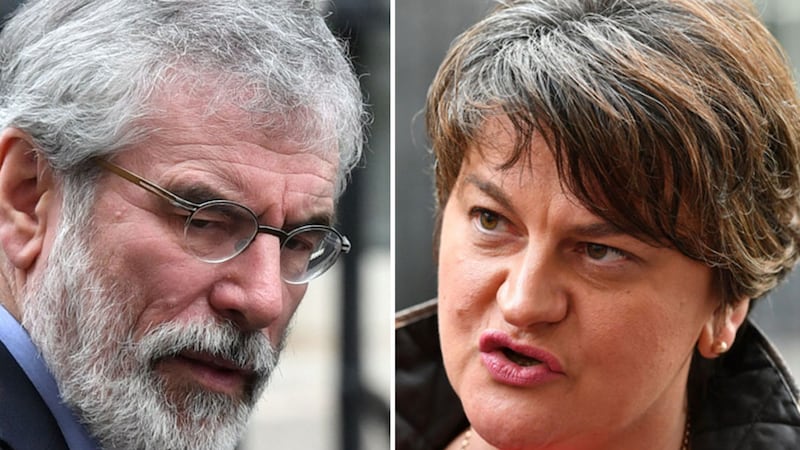A DUP warning that the "glorification of terrorism" by Sinn Féin is making it more difficult to restore power-sharing government in Northern Ireland has led to Gerry Adams calling for "a wee bit of sense."
Following talks in Downing Street with Theresa May, DUP leader Arlene Foster said they remained committed to the return of devolved government at Stormont.
However, she said that any agreement had to work for both unionists and nationalists, and that the activities of Sinn Fein were not helping.
"We did say to the prime minister that the glorification of terrorism at the weekend at the Sinn Féin conference was making it more difficult to bring around devolution," she said.
"We are talking about a deal unionism and nationalism can live with.
"They are talking about nationalism and that's it."
At the Sinn Fein Ard Fheis in Dublin at the weekend tributes were paid to the late Martin McGuinness.

One of the loudest cheers of the conference came when delegates were told that the former Stormont deputy first minister had been a "proud member of the IRA".
Speaking following the discussions with Mrs May, Sinn Féin president Gerry Adams said: "I didn't see any glorification of anyone at the Ard Fheis.
"I also, standing outside the office of the British Prime Minister, want to refute the use of this term 'terrorism'.
"Pejorative terms like that, which are about the sons and daughters of families, husbands and wives of families, who happened to serve in the Irish Republican Army and who died in the conflict, I don't use those terms.
"So let's have a wee bit of sense about this."
Northern Ireland at a crisis point, the result of poor leadership, Brexit, & a failure to deal with the past. agree that the current impasse likely to lead to restructuring of its politics and/or push for Irish unification. hoping it does not lead to any resumption of violence.
— Richard N. Haass (@RichardHaass) November 21, 2017
Mr Adams also accused the British government of adding a proposed amnesty for UK security forces to a public consultation document on potential mechanisms for dealing with the legacy of the conflict.
He said the insertion of the statute of limitations proposal, one he said amounted to an "amnesty", was an "act of bad faith" done without the knowledge of his party or the Irish government.
Asked about the difficulties in striking a deal with the British government, Mr Adams added: "I'm too long going in and out of this place to let anything annoy me.
"I understand how change works, it works when those who want change are prepared to engage with those who don't want change and persuade them it is in everybody's interests."
Sinn Fein emerged from No 10 with its own Troubles related complaint, accusing the Government of adding a proposed amnesty for UK security forces to a public consultation document on potential mechanisms for dealing with the legacy of the conflict.
Sinn Fein president Gerry Adams said the insertion of the statute of limitations proposal, one he said amounted to an "amnesty", was an "act of bad faith" done without the knowledge of his party or the Irish government.
The Prime Minister said she did not underestimate the challenge of striking an agreement to restore devolution, but she said she believed the differences between the two main parties were small and could be resolved.
"I believe it is imperative the parties come back together next week for talks and that we resolve these differences," said Theresa May.
“From our discussions it is clear that the issues dividing the parties are relatively small in number, focusing mainly around culture, legacy, identity and the future stability of the devolved institutions.
“While not in any way underestimating the challenges involved, I believe that a way forward can be found and an agreement reached.
“It is therefore imperative that the parties re-engage in intensive discussions next week aimed at resolving the outstanding issues so that the assembly can meet and an Executive be formed.”
The DUP and other unionists in Northern Ireland have long questioned whether Sinn Fein's reverence for the past actions of the IRA is compatible with building a shared society in the region.
The issue often manifests itself around commemorations for IRA members killed during the conflict.
Sinn Fein insists there are different narratives of what happened during the Troubles and that all sides should be entitled to remember their dead.
There was hope (not from me) that events at Ard Fheis might help talks process.Arlene Foster, after meeting with May, has knocked that back.
— Alex.Kane (@AlexKane221b) November 21, 2017








